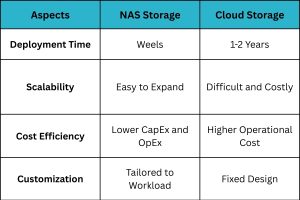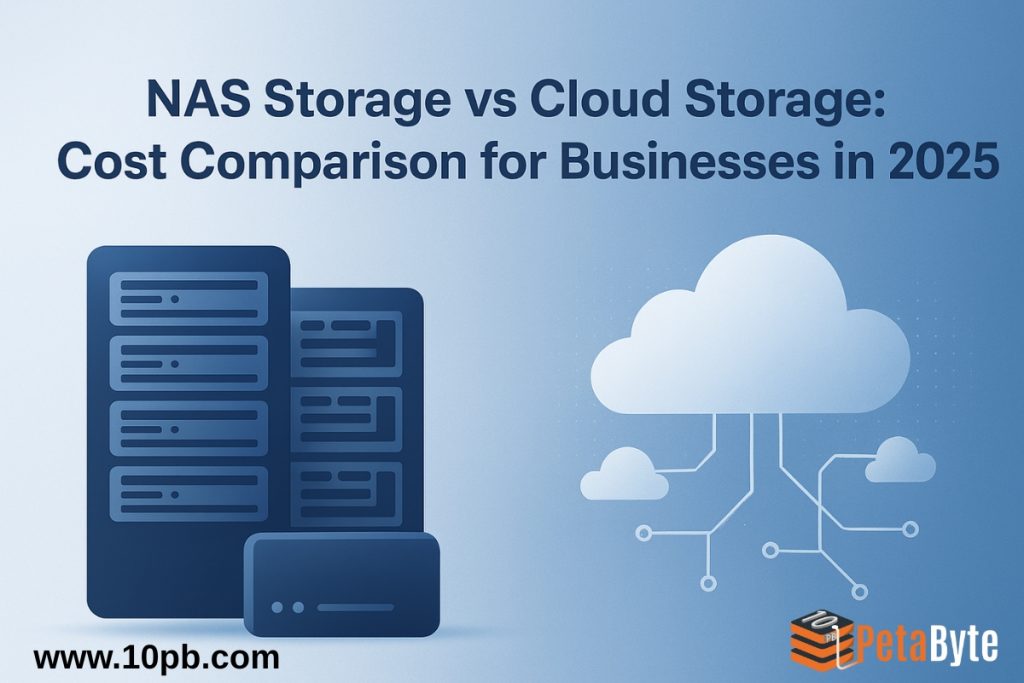Introduction to NAS Storage vs Cloud Storage
Companies are creating mass amounts of data on a daily basis—customer data, backups, analytics data, video and project files. As storage demand balloons, the big question is: should your business invest in 10pb NAS storage.
Each model has benefits, but for many organizations, the question comes down to economic factors and ROI.
👉 Looking for the most cost-efficient way to secure your business data?
Talk to our experts today and get tailored storage recommendations.
NAS Storage Cost for Businesses – Initial Setup & Maintenance
Network-attached-storage (NAS) is a storage system that is on-location and connects to your organization’s network.
- Upfront – businesses must buy hardware and drives for NAS.
- Continuing – some maintenance, electricity, and occasional drive replacements.
- Amortization – NAS has the lowest total cost in years (by allocating annualized costs).
- Bottom Line – NAS has a higher up-front cost and lower ongoing cost than subscription services.
👉 Want to explore NAS solutions for your business?
Request a consultation and discover the right setup for your IT budget.
Cloud Storage Pricing for Businesses – Subscription and Hidden Fees
Storage exchanges hardware costs for operating expense (OpEx), through subscription costs that are monthly or yearly.
- Subscription model: Pay as you go.
- Scalability factor: Immediate storage.
- Hidden cost: Data retrieval or egress fees.
Summary: Cloud storage has low up-front costs but once you begin a subscription the ongoing costs can start to add up quickly.
Know More About : Cloud Pricing
NAS Storage vs Cloud Storage Cost Comparison (Business Perspective)
When comparing NAS storage vs cloud storage costs, the difference lies in how costs are structured:

👉 Unsure which model fits your business better?
Book a free strategy call and we’ll help you calculate the best ROI.
Best NAS vs Cloud Storage for Small and Medium Businesses
NAS for SMBs
- Suited for businesses that want control over data.
- Works well for offices with predictable storage growth.
Cloud Storage for SMBs
- Ideal for startups with low initial budgets.
- Great for companies with remote teams.
Long-Term Total Cost of Ownership – NAS vs Cloud Backup
When analyzing NAS vs cloud backup costs, the total cost of ownership (TCO) is critical.
- NAS TCO: Cheaper in the long run.
- Cloud TCO: More expensive as data scales.
Scalability and Operational Costs of NAS vs Cloud Storage
NAS Scalability
- Growth requires hardware expansion.
Cloud Scalability
- Instant and flexible, but costs rise.
Security, Compliance, and Data Control in NAS vs Cloud Storage
- NAS: Greater data control.
- Cloud: Third-party managed, but compliance certified.
Looking for Premium Services in Netforchoice
When to Choose NAS Storage vs Cloud Storage for Your Business
Choose NAS if:
- You need long-term savings.
Choose Cloud if:
- You want fast deployment & flexibility.
Hybrid:
Best of both worlds.
Read About Npod- Micro Data Center for Your Business
👉 Still confused between NAS and Cloud?
Talk to our consultants for a hybrid solution that saves cost and boosts flexibility.
FAQ’S:
Q1: Which model is more economical for businesses in the long term, NAS or cloud?
NAS is more economical for businesses which have significant, and growing amounts of data stored.
Q2: What is the biggest cost advantage of cloud storage?
The low up-front costs and pay-as-you go model.
Q3: Are there hidden costs associated with cloud storage?
Yes, one cost in particular—data egress—and retrieval costs.
Q4: Does NAS need IT know-how?
Yes—but it gives you better control and predictability.
Q5: Can businesses use a combination of NAS and cloud storage?
Yes—a hybrid model usually achieves an optimal balance between cost and performance.
Conclusion
The debate between NAS storage vs cloud storage costs is about short-term flexibility vs long-term savings. NAS demands upfront investment but provides better ROI over time, while storage is easy to start but accumulates higher recurring costs.

